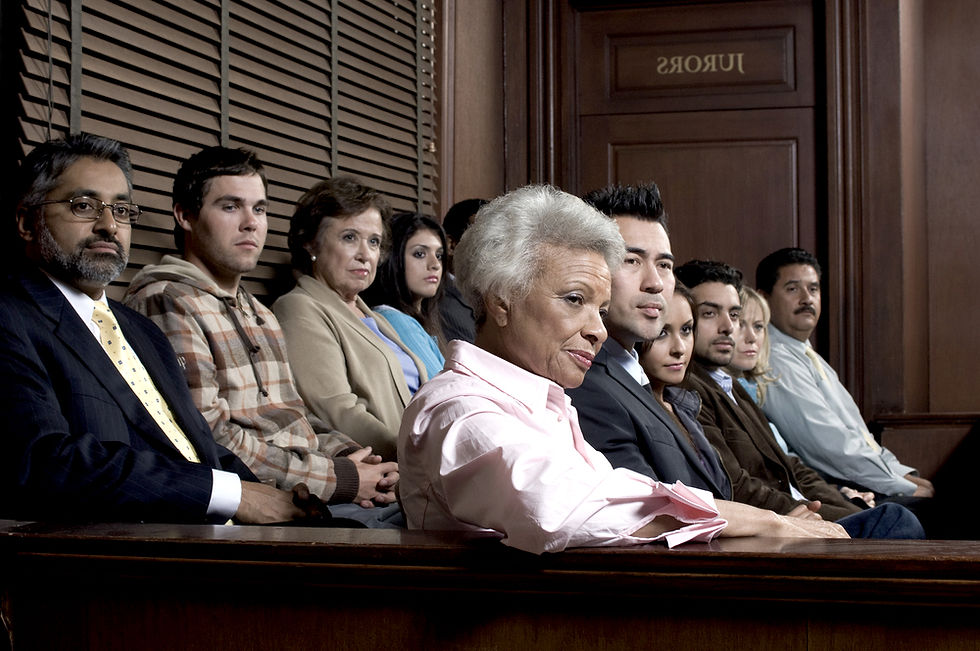INEFFECTIVE VOIR DIRE QUESTIONSAND WHY THEY DON’T WORK
- Angela Dodge

- Apr 12, 2023
- 3 min read
Effective and efficient questioning during voir dire is essential to seating a fair and impartial jury, or one that may even be slightly inclined to favor your case. (See article “Most Effective Voir Dire”). Asking empty or fruitless questions during voir dire not only wastes time, but yields little useful information when it is time to exercise strikes.
The following questions (or similar inquiries) should be avoided during voir dire. They are difficult to understand and interpret by jurors; some potential jurors may be insulted by them. Some inquiries ask for early promises jurors do not feel comfortable making. These kinds of questions are relatively ineffective and waste everyone’s time.

“Is there anyone here who feels they cannot apply the law as it will be given to you by the Court and render a fair and impartial verdict?” (Who would admit to being biased and unfair? Few jurors ever respond to this.)
“Can everyone here today promise that they will consider the facts and testimony they hear in the course of this trial and, applying the law as it is given to them, render a fair verdict?” (This is a “no-brainer” that also fails to indicate how a juror should respond – with a head nod?)
“The plaintiffs must prove their case in this trial, which is a civil trial and not a criminal trial like most of you may have served on before. They have to prove their case by a preponderance of the evidence. That means that their case must be more likely true than not. Is there anyone here who feels they would not be able to hold the plaintiffs to that standard?” (This one makes no sense to most people. Jurors must first understand this bit of legalese before they can assess their feelings about it.)
“Preponderance of the evidence means that our evidence is more convincing than the defense’s evidence. Is there anyone here who doesn’t understand that if our evidence is more convincing, you must find for the plaintiff? (This sounds like a court instruction that few jurors are prepared to process and answer during voir dire.)
“The State must prove its case against my client beyond a reasonable doubt. This means their proof must be so conclusive and complete that all reasonable doubts of the facts are removed from the mind of the ordinary person. Is there anyone here today who cannot insist on that level of proof? (This wording may be clear enough, but the word ‘insist’ might throw a curve.)

“Does anyone feel they cannot give my client a fair trial because of some prejudice or bias they may hold about _________?” (This requires a potential juror to admit in court that s/he is prejudiced and biased – not an easy admission under any circumstances. Further, most people are unaware of their biases, or feel it is socially unacceptable to admit them openly. This question only works for people who want to be excused from jury duty!)
“The judge will tell you that you must not let sympathy affect your verdict in any way. Will you be able to listen to what the judge tells you and set sympathy aside?” (How many people know in advance if this is possible without first hearing the evidence?)
“Is there anyone here today who feels that, for whatever reason, they cannot be an impartial juror in this case and render a fair and just verdict?” (Again, you’re asking for an open admission of bias in a room full of strangers and high-status court officers. While it is a difficult admission to make in open court, it does occasionally snag a juror or two, but more by accident than design, and the person who simply does not want to serve.)
“Is there anyone here today who feels that if a case does not settle out of court and actually makes it to trial, it must have considerable merit?” (This can be an effective question, but it also suggests a theory that jurors may not have developed and which may bias their perceptions of a case’s strength.)



Comments